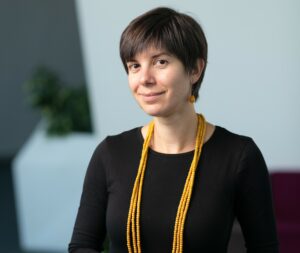“Bulgaria is at war against freedom of speech,” stated Asen Yordanov, the founder of the Investigative Journalism Site “Bivol” in an interview for the podcast “MFRR in Focus”. The interview was hosted by Anne ter Rele from the International Press Institute (IPI) and The Media Freedom Rapid Response. On May 12, 2022, she spoke with Asen Yordanov, and Boryana Dzhambazova, an independent journalist and media researcher, about the defamation campaigns, lawsuits and interrogations that independent journalists continue to undergo in Bulgaria.
Asen Yordanov emphasized the growing pressure facing Bulgarian journalists in a corrupt society. Citing reports from the European Union (EU) and the US State Department, Yordanov said Bulgaria has “no free judiciary,” and expressed how the Prosecutor’s Office in Bulgaria demonstrates direct dependence on organized criminal groups.
Asen Yordanov: We continue the battle
When asked about restrictions on press freedom, Yordanov gave an example from his current and previous experience. “Before I created Bivol 12 years ago, I was a journalist in some of the biggest newspapers in Bulgaria, but I was fired when an oligarchic group began to dominate the media,” the journalist said.
“That’s why I founded Bivol. So that I have a chance to have an absolutely free media in Bulgaria,” Yordanov explained.
“This is a medium for pure investigative journalism, analysis and political commentary.”
One of the theses in Rele’s questions was about the media, and its “armed” defenses created in order to protect private interests.
She asks whether those in power really use the media in Bulgaria mainly to defend their reputation, and in turn, demonize their competitors.
Yordanov was also asked about the financial and social threats facing Bivol, including the BGN 1 million lawsuit.
According to the journalist, the key to the case is the public’s support. “Any support during this case can save lives, because if we lose, it will be not only the end of Buffalo, but also the end of freedom of speech in Bulgaria, and will make other media outlets stay in line.”
Yordanov also described how journalists are being repressed by the authorities in Sofia: “Bulgaria is described in reports and analyzes as a country in the hands of the mafia and organized crime, and our political system is very dependent on these shadow influences. ”.
“Conducting non-profit investigations and uncovering the crimes of those people who run the country is very difficult because we don’t have the financial help and support.”
When asked about the difficulties in reporting honestly, Yordanov cited two assassination attempts against him by a leader of a Bulgarian political party, and another which was ordered by a high-ranking prosecutor.
“You can imagine how difficult it is to survive because you have absolutely no support from the authorities and you are fighting against the state.”
Since the creation of Bivol, his family and colleagues in the media have been under constant surveillance through repression.
“We are the subject of an investigation ordered by the Prosecutor’s Office in Bulgaria,” he said.
The next question in the interview brought up the presence of fear within Yordanov’s ability to continue moving forward with Bivol’s case. Is Asen Yordanov afraid of how the case will end? No, and he demonstrates firm perseverance, as well as a lack of fear.
Yordanov believes that the case against Bivol is “not just a case related to freedom of speech in Bulgaria”:
“This is also a case that has the potential to set a precedent for the whole EU,” he said.
Yordanov spoke about the strength of will and determination to continue striving for an honest future.
“We are not afraid. We will fight to the end, and I am sure we will win because the truth is on our side, “said the journalist.
He cites the case won by Bivol against the government of Kiril Petkov for refusing to disclose information under the APIA (the refusal of the Minister of Innovation and Growth Daniel Lorer to disclose documents about the electric car factory in Lovech – ed. Note).
“We continue to fight.”
Kiril Petkov hides the media, received EU money
The fight against corruption is demonstrated in the other half of Rele’s questions, where Boryana Dzhambazova explained how Bulgaria is ranked as the most corrupt country in the EU by the international human rights organization, Transparency International. She describes the current public system in Sofia as a “network of political scandals”.
“What are the main problems facing journalists in Bulgaria?” asked Anneter Relay.
“Media freedom in the country has been deteriorating for years,” Dzhambazova explained.
“According to the Media Freedom Index, we see Bulgaria continuing to decline.”
Bulgarian journalism also emphasizes the lack of transparency regarding media ownership in Bulgaria.
“Several years ago, Mayos Dragomir, a media expert in the country, asked me at what level we are compared to the Hungarian model. Unfortunately, we are not there yet, because the ownership of their media is at least transparent. ”
Dzhambazova clarified that “the common interests of politicians, entrepreneurs and the state are hidden behind a dense network of proxies.”
“And as a result, we have tabloid-style journalism.”
According to her, it is still very difficult to trace who finances which media. Dzhambazova also admits that very often in some mainstream media,
“Large-scale defamation campaigns are being carried out to intimidate independent journalists.”
“Many journalists I spoke to have complained that for years the budget has been used to sponsor certain publications and to buy friendly coverage,” Dzhambazova said.
She explains that outside of Sofia the situation is even worse, because the connections between the local centers of power and the dependence of the media on them are much deeper:
“Many regional publications are simply shut down.”
When speaking of media freedom, Boryana Dzhambazova mentioned one of the key names – that of MRF MP Delyan Peevski.
“Until recently, he managed to build a significant media network before being sanctioned under the Magnitsky Act.”
These kinds of sanctions have the potential to lead to progression, although there is never a guarantee; and the same goes for shifts in power.
Rele asks what the future of journalism in Bulgaria will look like after the change of government in Sofia.
Dzhambazova finds it difficult to answer: “After Peevski left the media industry, the two leading TV channels recently changed owners,” she said. “Some hope that this will change the media market in Bulgaria.”
“Others are skeptical because the company that acquired BTV is a holding company from the Czech Republic owned by a Czech oligarch. The situation with NOVA TV and many of the radio stations is similarly uncertain. “
The journalist also spoke about the unfulfilled empty promises of the new Prime Minister Kiril Petkov: “He promised in January that he would publicly reveal how EU funds were directed to certain media in exchange for favorable coverage.”
“Months have passed since that promise and so far we have not seen anything revealed.”
Relay asks about the future of Bulgarian journalism and what the recommendations of the two journalists are to promote freedom of the press.
Asen Yordanov believes that corruption and the links between organized crime, the ruling class in the country, and the defenders of the current judiciary must continue to be uncovered.
“This is the only way for me, this is the only way for Bivol and this is the only way for all honest journalists,” Yordanov said.
Dzhambazova referred to some of the guidelines she gave in one of her reports – to provide rules and an environment in which the media have clear ownership:
“To know where the money for financing the media comes from and what they publish.”
“It is also important how state budgets and communication budgets are spent on EU programs,” Dzhambazova explained.
“We need both open relations and respectable candidates (for the management of public media).”
“We often see these leaders being used by the state as tools to shut the mouths of certain journalists,” she said.
Co-authored by: Margarita Ivanova, Boston, USA
***
If you find this article useful, support our work with a small donation.
Pay a Bivol Tax!
We will highly appreciate if you decide to support us with monthly donations keeping the option Monthly
The form is not published.
IBAN: BG27 ESPY 4004 0065 0626 02
BIC: ESPYBGS1
Титуляр/Account Holder: Bivol EOOD
При проблеми пишете на support [at] bivol [dot] bg
This post is also available in: Bulgarian









You must be logged in to post a comment.